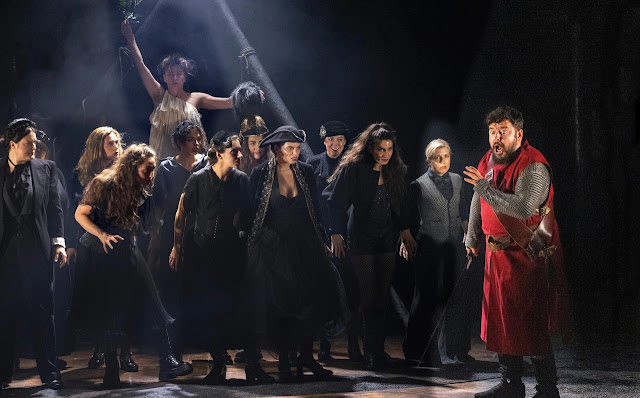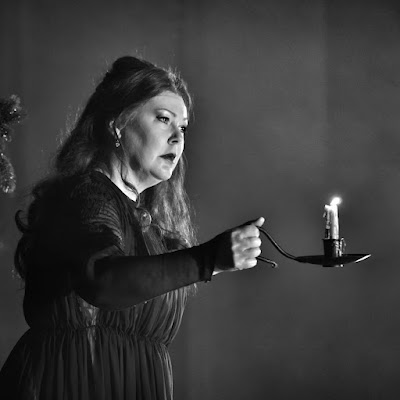 |
| Verdi: Macbeth - Gezim Myshketa - The Grange Festival (Photo Simon Annand) |
Verdi: Macbeth (1865); Judith Howarth, Gezim Myshketa, Jonathan Lemalu, Samuel Sakker, director: Maxine Braham, conductor: Francesco Cilluffo, Bournemouth Symphony Orchestra; The Grange Festival
Reviewed 11 June 2022 (★★★★½)
Stunning singing and vivid performances bring out the sense of character in the revised version Verdi's first Shakespearean opera
 |
| Verdi: Macbeth - Judith Howarth - The Grange Festival (Photo Bodnar Photography) |
We caught the second performance (11 June 2022) of Verdi's Macbeth at The Grange Festival in a production directed and choreographed by Maxine Braham and conducted by Francesco Cilluffo with Gezim Myshketa as Macbeth, Judith Howarth as Lady Macbeth, Jonathan Lemalu as Banquo and Samuel Sakker as Macduff. Designs were by Madeleine Boyd, with lighting by Matt Haskins.
There was a drop curtain, opened and closed by the witches, revealing a fixed set, a sort of distressed library with an upper walkway. The witches were in black, somewhere between punk and steam-punk, and from this library they produced the artefacts used to tempt Macbeth, the crown, the dagger. Throughout the opera, the witches were highly active, controlling the action, provoking, threatening and manipulating the characters.
There were five dancers, but the female chorus as highly highly active as the witches too. These were very physical witches, definitely not funny and Maxine Braham (director and choreographer, with Francesco Mangiacasale as associate choreographer) managed the difficult trick of making the witches chorus striking, characterful and threatening. So much so, that it was a shame that though we did not have the ballet as well. The vision scene was similarly imaginative with one of the witches giving birth to each of the apparitions.
Within this structure, the Macbeths and their fellow Scots were in loosely Medieval costume (the historical Macbeth ruled the Kingdom of Alba from 1040 to 1057). Judith Howarth's costumes as Lady Macbeth were striking but did not, alas, approach the splendour of the beetle wing dress worn by Ellen Terry.
 |
| Verdi: Macbeth - The Grange Festival (Photo Bodnar Photography) |
Yet she could be tender and inward in the moments when she was alone (significantly, the opera has no tender scene for the Macbeths). And in the Brindisi she was delightfully light-hearted and flirtatious, at least at first. In the sleepwalking scene there was no sense of a big voice being carefully managed as can happen in this opera, instead a finely spun line and intense, inward feeling of character. This was one of the most complete and consummate accounts of Lady Macbeth that I have seen, commanding and fierce, unnerving yet also very human and arc from beginning to end was finely judged.
Albanian baritone Gezim Myshketa made a fine companion and was more than equal to Howarth's vocal histrionics. Myshketa was also remarkably sympathetic; for many of his solo moments, Braham brought him forward to the fore stage, almost like a little boy sitting on the naughty step. This lent an intimacy to the performance, making it personal. There was bluster aplenty in the big scenes, but Myshketa also showed a willingness to sing quietly.
The two made an impressive pairing, well sung yet full of character and humanity. Around these, the smaller characters were well taken and clearly defined. Jonathan Lemalu's Banquo was noble and warmly sung. Not for the first time you felt he could easily have moved to the title role. Samuel Sakker gave a moving account of Macduff, a noble character around whom chaos swirled encapsulate in a well sung account of his Act Four aria. Andres Presno was strong in the small but important role of Malcolm, with Katie Lowe as the lady in waiting and Timothy Dawkins as the doctor. A credit too, to the four children (from Twyford School) who formed the young apparitions.
The chorus overall was on terrific form, making a strong, focused sound and theirs was often a highly active role. Sometimes this physical activity had an effect on ensemble but overall this was strong stuff. In the pit, Francesco Cilluffo kept things on a tight rein. Sometimes highly driven, sometimes more relaxed, this was a light highly articulated performance from the Bournemouth Symphony Orchestra that maximised the character of Verdi's somewhat rum-ti-tum orchestral accompaniment.
This production was a remarkable achievement. Verdi's Macbeth is an opera that is so easy to do badly, and here The Grange Festival gave it to us on a highly concentrated scale, full of character, well paced and with some fine singing indeed.
Never miss out on future posts by following us
The blog is free, but I'd be delighted if you were to show your appreciation by buying me a coffee.
Elsewhere on this blog
- Baroque mind games: Handel's Tamerlano at The Grange Festival - opera review
- Violinist Midori Komachi has not only recorded Vaughan Williams' Violin Sonata but is planning performances of the composer's music in Japan - interview
- A romantic woodland walk with Igor Levit and Simon Bode at Wigmore Hall - concert review
- i berzs, i smilgas... (and a birch and grasses...) - Latvian song across the generations from Emils Melngailis & Kristaps Petersons - record review
- Precious Things: a lovely survey of Bernard Hughes' recent choral music from Epiphoni Consort on Delphian - record review
- Hearing with new ears: Italian pianist Pina Napolitano wants her Conway Hall recital Tempo e Tempi to make the music of Carter more familiar and that of Beethoven more unfamiliar - interview
- Returning the work to its Opera Comique roots: an engaging new Carmen from Opera Holland Park that adjusts tradition rather than reinventing it - opera review
- Emotional atmospheres: a wonderfully lucid production of Tchaikovsky's Eugene Onegin opens Opera Holland Park's 2022 season - opera review
- Real music-making of the highest standards: the Swiss youth orchestra "il mosaico" is caught on tour in Italy by composer Edward Lambert - concert review
- Premiered in Norwich in 1936, the Norfolk & Norwich Festival give a celebratory performance of Vaughan Williams' Five Tudor Portraits - concert review
- A forgotten voice from an earlier era: Mr Onion's Serenade - Mandolin Music of the Edwardian Era - record review
- What a lovely night: an evening inspired by Jenny Lind's charity concerts in Norwich - concert review
- Enjoyment and discovery: Paul McCreesh and Gabrieli Consort & Players in Bach's Ascension Oratorio at Wigmore Hall - concert review
- Home

.jpg)









No comments:
Post a Comment